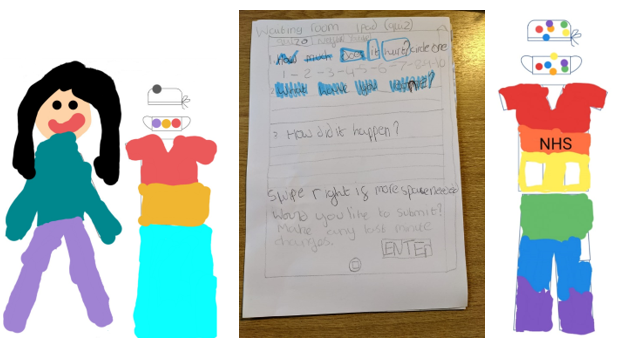Data and evidence: Foreword
Hear from the leads of this workstream and read a summary of what children and young people think about data.
From the leads of this workstream
As clinicians we sense that the number of outpatient and emergency referrals is increasing. Those of us who are longer in the tooth might say “it was not this busy when I started working here”. But has activity changed or we just forming memories based on peaks in activity?
Predicting the future is generally considered an uncertain and unrewarding business. Perhaps. But as clinicians we are constantly judging what is likely to happen. Every working day we try to anticipate what is going to happen with a patient over the next few hours, days, and weeks. Data (from tests) often form an important part of our forecasting. We are used to working in an environment where there are rarely any absolutes, and where there is always some risk things won’t go to plan. We work as a team and blend experience with evidence, and then make assessments for each individual to come up with a relative risk for what might happen. We put in safety netting and then monitor the situation and see what happens. In a way Paediatrics 2040 is a similar process.
Lord Kelvin famously said words to the effect that if you can measure what you are speaking about, then you can know something about it. For this reason, the Paediatrics 2040 programme included an extensive data collection workstream. We aimed to collect data from the four nations on both outpatient/scheduled and emergency/unscheduled referrals to paediatric services and also paediatric “footfall” in general practice and emergency departments.
The past provides us with the only real indicator of what the future might be like. Projections from this are imperfect but the best we have. We’ve studied change in burden of disease and healthcare activity over the past two decades and used this to forecast the most likely situation in 2040. We sought to study changing trends in activity by age and deprivation and also between regions and nations.
Nothing ever stays the same and activity across the broad spectrum of child health activity is changing. The multiple drivers for change include health-seeking behaviour, changes in unscheduled care pathways, an ever-increasing workload in primary care, increasing complexity of patients, increasing treatment options and changes in secondary care services (including working practices). This change is likely to accelerate in the coming years and Paediatrics 2040 allows RCPCH and its members to be more proactive in planning and less reactive.
Professor Russell Viner, Co-Chair of the Paediatrics 2040 Data Workstream and President, RCPCH
Professor Steve Turner, Co-Chair of the Paediatrics 2040 Data Workstream
Alison Firth, Paediatrics 2040 Project Manager, RCPCH
From RCPCH&Us, the voice of children, young people and families
We think data is important, it helps you to know when a service or person is doing really well, or when they might need some help to improve, or when things like the pandemic happens, it tells you what we are not using any more. It can be hard deciding what data is useful though.
“Would rather wait it out [the pandemic] than go for help so not to burden the NHS” RCPCH &Us 2020, England
We think there are different types of data that could be kept so that you know what the service is like from our point of view too, like data on how many children and young people are involved in service improvement, whether students have been able to sign up with health services at home and at uni, or data about how many different ways and different people get to share their ideas and give feedback about services or the doctors.
“There should be a youth doctor who can deal with complaints from young people” RCPCH &Us 2021, Northern Ireland
We also think there should be more data collected about different topics like how many doctors get mental health first aid training, or about the things that make us unique and not just about our condition like if we are from a different background like we are trans or from a black background.

